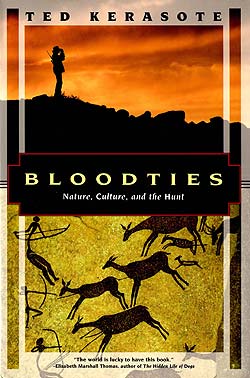Excerpt: “Bloodties: Nature, Culture, and the Hunt,” Ted Kerasote, 1994
 This file contains two brief excerpts (pp.250-257; 266-267) from Ted Kerasote’s book Bloodties: Nature, Culture, and the Hunt (Kodansha Globe, 1994, out of print).
This file contains two brief excerpts (pp.250-257; 266-267) from Ted Kerasote’s book Bloodties: Nature, Culture, and the Hunt (Kodansha Globe, 1994, out of print).
Bloodties is the source of several controversial quotes attributed to Wayne Pacelle, CEO of HSUS. They resulted from in-person interviews the Kerasote conducted with Pacelle in January 1992.
Among the most interesting bits of Bloodties:
- [Pacelle:] “I’ve always had an affinity for wildlife, and the direct assault made on that wildlife by hunters and trappers has always infuriated me … At the same time, I don’t have a hands-on fondness for animals. I did not grow up bonded to any particular nonhuman animal. I like them and I pet them and I’m kind to them, but there’s no special bond between me and other animals…” (pp. 250-251)
- —”Do you think that people were once a natural, interactive part of their ecosystems?” I ask.
—”Maybe before the invention of agriculture,” he says. (p. 253) - —”[W]ould you let people hunt for food if they did it respectfully?”
—”Well, it’s a good question,” he says, pondering what he’s about the say. “I think that I would campaign against it. Yes, I think that I would.” (p.254) - —”[A]re you a proponent of endless agriculture for endless people?”
—”Oh, no, no. I don’t believe in the green revolution as a means of feeding the world, and I certainly don’t plan to have children. I take it as a very serious personal responsibility not to put another consumer on this planet.” (p. 255) - After stopping for potato chips, pretzels, and beer, and making only two more wrong turns, we find Heidi Prescott’s town house. She’s the national outreach director for the Fund [for Animals] and is famous—the first person to go to jail for animal rights. Rustling leaves with her feet, during a public hunt at a Maryland wildlife management area, she was fined five hundred dollars under a state law that forbids the harassment of hunters. Refusing to pay the fine, she spent fifteen days in jail, which opened her eyes to the plight of inmates.Heavy set, jovial, and blonde, she has told me, “If I gave up animal rights and zero population work, I’d go into prison reform.” At twenty-nine, she’s already had her tubes tied for four years and declares that she’s “never regretted the decision.” After all, “population is the bottom line.” (pp. 255-256)
- —”About fishing … do you avoid campaigning against it because there isn’t a ground-swell movement in our culture to eliminate it?”
—”That is correct. We’re out to minimize suffering wherever it can be done, and wherever our limited resources can be utilized most effectively—abusive forms of hunting for now, all hunting eventually.”
—”And fish aren’t furry and cute.”
—”That’s right.”
—”How about pets, Wayne? Would you envision a future with no pets in the world?”
—”I wouldn’t say that I envision that, no. If I had my personal view perhaps that might take hold. In fact, I don’t want to see another cat or dog born. It’s not something I strive for, though. If people were very responsible, and didn’t do manipulative breeding, and cared for animals in all senses, and accounted for their nutritional needs as well as their social and psychological needs, then I think it could be an appropriate thing. I’m not sure. I think it’s one of those things that we’ll decide later in society. I think we’re still far from it.” (p. 266)
We believe reproducing this material constitutes a “fair use” as provided for in section 107 of the U.S. Copyright Law. If you wish to use this material for purposes of your own that go beyond “fair use,” you must obtain permission from the copyright owner.



